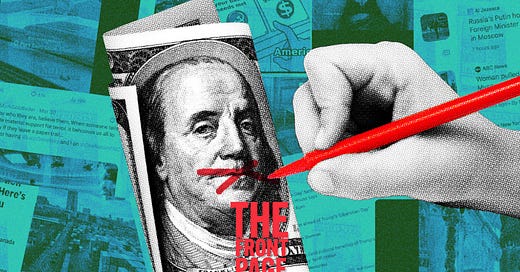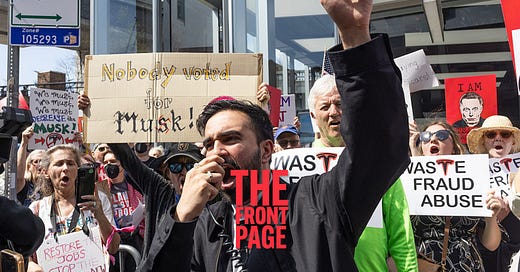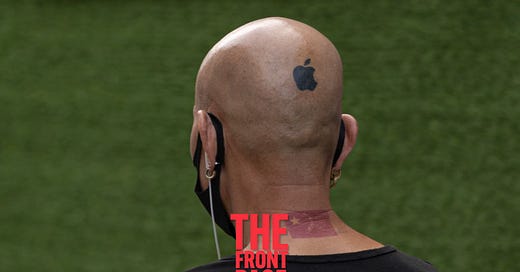
The Free Press

In case you hadn’t noticed, there’s a lot going on. On The Front Page today, we bring you reporting, analysis, and commentary on the ongoing fallout of Trump’s brush with death; another prime time Biden interview; the dismissal of the Trump classified documents case; and much more.
But first: the Hillbilly running mate.
Donald Trump’s selection of J.D. Vance as his running mate is remarkable in more ways than one. There is Vance’s journey from the broken home in a poor, rural Ohio he wrote about in Hillbilly Elegy, to the Marines, to Ohio State, then to Yale Law School and to the Senate, and now a presidential ticket. Also remarkable is his transformation from a prominent “Never Trumper”—who once called his now–running mate “America’s Hitler” and an “opioid for the masses”—to an enthusiastic Trumpist in the vanguard of the New Right.
For some, Vance’s journey is simple enough to explain: it’s the story of a smart and ambitious “sellout” and an “angry jerk,” as one of his (ex-) friends from law school put it on X yesterday. To this crowd, Vance is only the most extreme example of a familiar story of Republicans kowtowing to the man who took over their party.
But Vance is a much more complicated—and interesting—figure than that.
Agree with him or not, he has undergone a sincere ideological conversion since 2016. That much was obvious to me when I followed him on the campaign trail in 2022. And it’s obvious from any speech or interview he gives. He is not someone who just parrots his party’s talking points. (He has also undergone an actual conversion: I recommend Rod Dreher’s interview with him on the day he was baptized and received into the Catholic Church in 2019.)
In the Senate, he hasn’t just voted with the GOP herd but teamed up with Democrats on a range of bills that stake out new ideological territory for Republicans. He makes some of Trump’s donors uncomfortable.
By picking Vance, Trump has made clear his project is about more than personality. The Republican presidential ticket now has a distinct ideological flavor. It has teeth. National Review’s Philip Klein called the pick “another nail in the coffin of Reagan Republicanism.” (This is not a compliment at that magazine.) Vance is a prominent critic of U.S. involvement in Ukraine (for more on his foreign policy views, I recommend this piece by my colleague Isaac Grafstein).
He’s also economically unorthodox—and more relaxed about government involvement in the economy than many of his colleagues. He has backed a higher minimum wage and praised Lina Khan, Joe Biden’s FTC chair and a proponent of more robust antitrust policies.
Did these ideological considerations clinch it for Vance? I suspect a bigger factor was that in Vance, Trump saw someone who was welcomed into the elite—as Trump never has been—but who turned his back on it.
How did the pick go down at the RNC in Milwaukee? Olivia Reingold was on the convention floor to find out.
It’s just before 4 p.m. and everyone at the Republican National Convention is jockeying for a glimpse of Senator J.D. Vance. A woman kicks off her bedazzled heels, then stands on her seat barefoot to get a better view. A delegate tells me he just borrowed a woman’s lipstick to scrawl “VANCE” in capital letters on a white Trump sign.
Everyone is craning their necks toward the Ohio delegation, where Vance is shaking hands, posing for selfies, and gleefully fist-bumping attendees who pull away with a bewildered look, as if they can’t believe they just crossed paths with the future vice president of the United States.
“We love you, J.D.,” a man bellows through a rolled-up “Trump 2024” poster.
Vance—the man of the evening—pulls back for a second, as if to process the surreality of the moment, then shouts back: “I love you too, man.”
On Monday, Vance continued his ascent as the wunderkind of the Republican Party by becoming Trump’s 2024 running mate. In a statement released on Truth Social, the former president—and recent survivor of an assassination attempt—announced that 39-year-old Vance, who was elected senator of Ohio only two years ago, was “the person best suited to assume the position of Vice President of the United States.” Click for more from Olivia on the Trump critic turned Trump running mate.
A lot happened in American politics last night: the Biden interview, the Vance unveiling, Trump’s RNC entrance—his first public appearance since Saturday’s shooting. And there, to help you all make sense of it, was the Free Press team in our first-ever live video on X. To be honest, we weren’t sure how it was going to go. We were blown away by the response.
There were some 350,000 of you watching this experiment, in which we had the kind of panel we wish were assembled on cable news, or as host Michael Moynihan put it: “the Traveling Wilburys of political panels.”
Monday night’s supergroup included Newsweek editor and Free Press contributor Batya Ungar-Sargon, Puck correspondent Tara Palmeri, Red Scare co-host Anna Khachiyan (chain-smoking, of course), legendary pollster Frank Luntz, Manhattan Institute president Reihan Salam, author and Free Press contributor Rob Henderson, and journalist James Pogue. This is a group of people you just cannot find anywhere else.
If you missed it, catch up below. And stay tuned for more live! Follow The FP on X.
Doug Mills is the photographer who captured the remarkable image of Donald Trump and the bullet that clipped his ear on Saturday. Here he gives his first account of the shooting. “I probably did not do the smartest thing by running right at it, but that’s what [photojournalists do],” he said. (Fox News)
In a New York Times/Siena survey conducted before Saturday’s shooting, Kamala Harris outperforms Joe Biden in two states: Pennsylvania and Virginia. The near assassination of Donald Trump has bought Joe Biden time in his fight to remain his party’s nominee. One Democratic insider said Sunday the shooting “probably saved Biden’s nomination” but also “doomed his reelection.” (New York Times)
If any Democrats thought Joe Biden was their only problem, a new poll from NBC makes for a sobering read. It finds that the popularity of the Democratic Party has taken a dive and now matches its all-time low in the three-decade history of the survey. The party is the most unpopular figure or institution in the poll. (NBC)
Trump once unified Democrats and divided Republicans. The shooting and the debate have turned the tables, writes Jonathan Martin. He reports that Nancy Pelosi, convinced that Biden will lose, has been “working the phones” since the debate looking for a “way to ease him off the ticket.” (Politico)
Joe Biden agreed to extend Secret Service protection to RFK Jr. on Monday. The independent presidential candidate, whose father was assassinated on the campaign trail in 1968, has been asking for federal protection for months. After Saturday’s assassination attempt on Trump, the only question is: What took Biden so long? (Associated Press)
Comparisons between Trump and nineteenth-century president Andrew Jackson are nothing new. But Walter Russell Mead argues that “Saturday’s events made America more Jacksonian and gave Mr. Trump an unbreakable hold on Jacksonian America.” (Wall Street Journal)
The system is out to get you, says Substack co-founder Hamish McKenzie: “Our leaders have called for a cooling down of our political rhetoric, but unfortunately this is not a problem that can be solved by presidential decree. To change the conversation—not just its contents, but also its tenor and tone—we need to change the incentives of a system that has ensnared us in its addiction feeds.” (Substack Reads)
Forty-four percent of Ukrainians support starting peace talks with Russia, compared to 35 percent who say it is not time to negotiate yet, according to a new poll. Zelensky said he was open to a Russian delegation attending peace talks later this year. (Semafor)
A French soldier was stabbed Monday in Paris, eleven days before the Olympic opening ceremony. The soldier was injured but is not in a life-threatening condition. (ABC)
Rapper 50 Cent has been shot nine times. His song, “Many Men (Wish Death)” is an ode to cheating death. In Boston on Saturday night, he performed the song in front of a blown-up version of his album cover Get Rich or Die Tryin’, only Donald Trump’s face replaced that of the rapper. There is chatter that “Fitty” might perform at the Republican convention this week. (Vibe)
As the dust settles after Saturday’s very nearly successful attempt on Donald Trump’s life that killed one person in the crowd and left two in critical condition, one of the many confounding questions that linger is: How did the Secret Service fail so badly? Some have noted the Secret Service’s DEI push under current head Kimberly Cheatle. Amid serious retention and recruitment struggles, she has said she is focused on “attracting diverse candidates.” Does this suggest an organization laser-focused on its purpose: ensuring the safety of its protectees? Or does it suggest a bloated and distracted bureaucracy in dire need of reform? Rupa Subramanya investigates.
→ Trump’s classified documents case is thrown out—for now, writes Yale Law professor Jed Rubenfeld: In a legal stunner, Judge Aileen Cannon yesterday threw out Special Counsel Jack Smith’s classified documents prosecution of former president Trump.
Contrary to early reporting, Judge Cannon’s dismissal of the case had nothing to do with the presidential immunity ruling recently announced by the Supreme Court in Smith’s other prosecution of Trump—the one dealing with January 6.
Instead, Judge Cannon ruled that Attorney General Merrick Garland had no constitutional authority to appoint Smith as special counsel in the first place. Because the appointment was unconstitutional, Smith had no power to bring a criminal case against Trump. So the whole case had to be dismissed.
Boiled down, Judge Cannon’s key conclusion is that no statute authorizes the attorney general to appoint a special prosecutor if the appointee is someone from outside the Department of Justice, as Smith was when he was appointed. But Judge Cannon faces a little problem in reaching her conclusion: the Supreme Court stated the opposite in 1974.
In the landmark U.S. v. Nixon case, the Court ordered President Nixon to comply with a subpoena issued by Leon Jaworski, who had been named special prosecutor to investigate the Watergate scandal even though he was outside government at the time of his appointment. Citing the same statutes that Garland and Smith relied on, the court stated that Congress had “vested in the Attorney General” the power to make Jaworski a “Special Prosecutor with unique authority and tenure.”
In the decades since, lower courts, including appellate courts, have considered this statement conclusive. But Judge Cannon held that the Court’s statement was mere “dictum”—a point of law assumed only by the Court, not actually ruled on, and therefore, not binding on her.
This remarkable conclusion makes her ruling extremely vulnerable on appeal.
In her favor is the fact that Justice Clarence Thomas, in the immunity case, strongly implied that he views Jack Smith’s appointment as unconstitutional. Against her is the fact no other justice joined Thomas.
Smith will undoubtedly appeal, but one consequence is certain. Just as the Supreme Court’s presidential immunity ruling guaranteed that Smith’s January 6 case against Trump won’t be tried before the election, Judge Cannon’s ruling has the same effect on the documents case. Given the appeals process, it will be a very long time before this case could ever be tried. And long before then, there may be an occupant of the Oval Office who sees to it that this case is dropped. —Jed Rubenfeld
→ Biden doesn’t lower the temperature: For Americans looking to see if President Joe Biden has changed his approach to the presidential election after an assassin nearly killed his opponent, Donald Trump, Monday evening’s interview on NBC will have been disappointing.
Biden stuck to his talking points about lowering the rhetorical temperature in the nation. But he seems to believe this advice does not apply to himself. Holt asked the president about some of his own overheated rhetoric. “You called your opponent an existential threat,” Holt said. “On a call a week ago you said, ‘It’s time to put Trump in the bull’s-eye.’ ”
Biden replied with confused defiance. “I didn’t say cross-hairs,” Biden said in response to a question about putting Trump in the “bull’s-eye.” When Holt corrected him and said he indeed did say “bull’s-eye,” Biden responded, “It was—it was a mistake to use the word. I didn’t mean—I didn’t say ‘cross-hairs.’ I meant ‘bull’s-eye.’ I meant focus on him. Focus on what he’s doing.”
Biden recovered a bit after that, but still made the case that his calls for calm after Saturday’s shootings referred to Trump and his supporters and not his own side. “I’ve never seen a circumstance where you ride through certain rural areas of the country and people have signs there stand—big Trump signs with—middle—signs saying ‘F Biden’ and the little kid standing there putting up his middle finger,” he said.
Apparently, Biden is unfamiliar with the last eight years of his party and supporters comparing Trump to Hitler and asserting that Trump is a Russian agent. Biden seems unaware of his own Twitter feed. On June 28, Biden’s X account posted, “Donald Trump is a genuine threat to this nation. He’s a threat to our freedom. He’s a threat to our democracy. He’s literally a threat to everything America stands for.”
None of this is to absolve Trump for his own excessive rhetoric. Trump’s irresponsible speech is well-known because it has been covered extensively by the mainstream media since he announced his first bid for the presidency in 2015.
But the excesses in countering Trump by the Democrats have been papered over. After Saturday’s near catastrophe in Butler, Pennsylvania, one might expect the leader of the Democratic Party to pull back and reassess. After Biden’s interview Monday evening, don’t hold your breath. —Eli Lake
→ Morning No: In the wake of Saturday’s near assassination of Donald Trump, everyone from elected officials to media bigwigs agrees it’s time to “lower the temperature.” At 30 Rockefeller Center, NBC executives decided that the only way they could ensure they were seen to calm things down was to turn the dial right down to zero in the studio of Morning Joe, MSNBC’s flagship breakfast news show. Per one report: “A person familiar with the matter told CNN that the decision was made to avoid a scenario in which one of the show’s stable of two dozen-plus guests might make an inappropriate comment on live television that could be used to assail the program and network as a whole.”
Translation: At a crucial moment for the country—right after an attack on American democracy, as the RNC gathers to nominate Trump, and with Joe Biden fighting to stay in the race, we don’t trust the people we pay to bring you the news to bring you the news. It’s confirmation that so much of cable news exists for partisan entertainment, not to inform its audience. And next time you think of switching on MSNBC, ask yourself: If the network’s own executives don’t trust these people, why should I? —OW
→ Who wants a Trump Got Shot tattoo? America’s great entrepreneurial spirit kicked into full gear over the weekend, after the attempted assassination of former and probably future president Donald Trump. A veteran of reality TV, Trump knows better than anyone how to play for the cameras, and he proved it this weekend. The bloodied face, the raised fist, the American flag in the background—it’s a hell of a picture, and now, it’s everywhere. You can buy it on t-shirts from former Trump assistant Sebastian Gorka, or right-wing commentator Candace Owens, or Etsy, or even from random boardwalk shops.
Images of the bloodied, defiant Trump are also available on trading cards; a fake $2 bill that, perhaps criminally, advertises itself as “Genuine U.S. Legal Tender”; coffee mugs; and much more. People have already designed and administered tattoos of it. They vary in quality.
Is it in bad taste to profit from an act of political violence that left an innocent bystander dead? Yeah, probably. But do you think anyone wearing a politically charged graphic tee is worried about taste? This is America, a country where people go to museums and visit the gift shop first. There’s no version of our nation where this doesn’t happen, so if you’re on the fence about making your own Trump assassination merch, strike while the iron is hot. This is the American dream, and if you aren’t selling out, you’re buying in! —River Page
Oliver Wiseman is a writer and editor for The Free Press. Follow him on X @ollywiseman.
To support The Free Press, become a paid subscriber today:
And if you’re enjoying The Front Page, consider forwarding it to someone else you think might like it.





















So what Biden was trying to say in the Holt interview was that he was not calling for Trump to be shot with a rifle, but shot with a bow and arrow?
As a Ukrainian, one of the article mentioned that 44% of Ukrainians want a peace talk - that is false. Everyone knows, as with Chechnya back in 1990s, russia needs a break for sometime to rebuild their destroyed army. They need time to regroup, work on their mistake and in few years take all Ukraine and some other parts of Europe back.
We understand that war will end with a peace talk eventually; however, this is not the time yet.